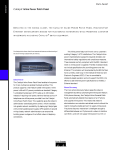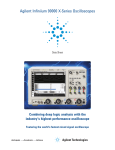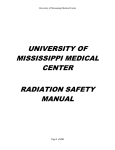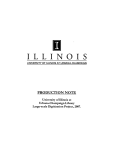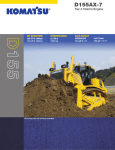Download GE Conventional Slickline Capabilities Capabilities Overview
Transcript
Logging Services Capabilities Overview GE Oil & Gas 4 6 9 EHS Initiatives Wireline Services Cased Hole Logging Services 10 Cased Hole Logging Services 11 Depth Control/Correlation 13 Formation Evaluation 14 Cement Bond Evaluation 15 Production Evaluation 17 Casing and Borehole Integrity 19 Pipe Recovery 23 Perforating 26 Mechanical Services As a leading innovator in oilfield technologies, GE Oil & Gas not only designs, develops, and engineers high quality performance tools for the oil and gas industry, but we also provide a full range of logging services to our customers. With proven expertise and efficiency, our teams of specialists can deliver a comprehensive services solution tailored to your specific needs. By drawing on GE’s global resources—and our constantly growing experience base—we can provide onshore and offshore services to oil, gas, and power generation customers in the U.S. and around the world. Our portfolio of wireline and cased hole logging services includes depth control/ correlation, formation evaluation, cement bond evaluation and production logging evaluation. We also offer casing and borehole integrity, pipe recovery, and perforation services—as well as a full range of mechanical services. The following pages highlight some of these key services—as well as the innovative equipment we use to help you improve performance at your site. GE Oil & Gas Training Center Weimar, TX Gun Loading Facility Corpus Christi, TX GEOG Log Analysis Center (LAC) Houston, TX EHS Initiatives GE Oil & Gas has recognized the immediate need for a dedicated Training Center staffed by highly trained instructors with decades of experience to train tomorrow’s leaders in the oil and gas industry. We provide in-depth training to individuals within the first 30–90 days—and then maintain an ongoing training regimen to reduce turnover and build a solid foundation of experienced field personnel second to none. GE Oil & Gas has dedicated Gun Loading Facilities located in Corpus Christi, TX and Midland, TX to serve the demands of the Eagle Ford Shale region and Permian Basin. We work hard to mitigate risk and consider people, communities and the natural world in everything we do. That applies to everything from the layout of our workshops to GE's global 'ecomagination' program, dedicated to delivering products that are better for business and the environment. The GE Oil & Gas Training Center is centrally located in Weimar, TX—conveniently located on I-10 between Columbus and Schulenburg, Texas. This Weimar Training Center is well equipped with a conference room and a test well to simulate real-life well conditions. We also use the dedicated facility for research and development of new technologies, commissioning of new equipment, and training our field personnel in proper operations and procedures for the services offered. GE Oil & Gas continues to provide technical expertise, supply the most comprehensive and coherent well analysis available. Our goal to deliver accurate reservoir dynamics, production capabilities, casing integrity validation, lithology identification and porosity evaluation is core to our LAC department’s objectives. Working with our on-staff Petroleum Engineer and the Print Distribution Center (PDC), GE Oil & Gas delivers detailed well log interpretations— both electronic and hard copy well logging presentations—along with a secure archive platform that is available as needed for prompt access and delivery of all digital data. 4 The centralized Gun Loading Facility provides operational standardization in the assembly of the perforating gun commonly used in hydraulic fracturing pump down operations. 5 Wireline Services Conventional Slickline Services Our conventional slickline services teams can deploy 7/32 in, 1/4 in, and 5/16 in Dyform® cables, as well as carbon plow steel and alloy slickline wires. We offer a wide range of services, including sleeve shifting, swabbing, paraffin scraping, and bailing. Conventional and Special Services Other capabilities include: • Setting and removing plugs • Setting and retrieving packers • Installing and replacing downhole safety devices and gas lift valves or dummies Full-Service Capabilities Proven Performance + Proven Technology = Services You Can Rely On Operating from four key locations, GE’s wireline services teams have the resources, and the mobility, to provide a full portfolio of services to support our customers’ operations for the lifetimes of their wells. With expertise in land-based operations— as well as shelf and deepwater operations in the Gulf of Mexico—our skilled crews 6 can draw on innovative equipment and processes developed by GE to create the right services package for your needs. high-pressure, H2S, and CO2)—with an established mobile fleet that includes: • G auge runs, basic fishing operations along with fishing of capillary tubing • Wireline trucks GE’s operations managers average over 30 years of experience in providing oilfield technology services—while our service supervisors and operators average more than 20 years of experience. Together, their mission is to help you reduce operating costs and extend the life of your well. • Quick-rig wireline trucks • E lectronic timer and mechanical slickline, cable or capillary tubing cutters Highly Trained Services Teams in a Wide Range of Environments GE’s services teams can operate in hostile environments (including high-temperature, • Slickline shelf skids • Combination slickline/e-line skids We also can deploy pressure control equipment ranging from 5000 psi, 10,000 psi, and 15,000 psi, along with proprietary technologies such as our Slickline greaseinjection stuffing box. Our services teams can also deploy proprietary GE-developed equipment, such as our explosive power hammer—which can be used to dislodge fish and knock out cast-iron bridge plugs. Whatever your needs are, we can provide the solution that best suits your project. Special Services Electronic Memory Logging GE’s Special Services team in conjunction with GE Oil & Gas Downhole Technology (GEOG-DT) can deploy fast, flyable electronic memory logging equipment that can be run on slickline, braided cable, or coiled tubing. Our services teams utilize a production logging suite to provide swift and accurate production measurement within wells. Experienced GE specialists can use this suite to locate and identify hydrocarbon entry, reduce water production, and monitor injected fluids—while helping to reduce customer operating costs. The production logging suite’s array of instrumentation includes these tools: • Quartz pressure • Platinum temperature • Gamma ray • Fluid capacitance • Fluid density • Flowmeter • Casing collar locator These logging instruments can also be run in various combinations as required for pressure/temperature logging and gamma ray depth correlation. They can also be used as a radial bond tool, and for tubing and casing calipers. Firing Devices Our services specialists deploy a full range of perforating guns and setting tools for cast-iron bridge plugs, umbrella plugs, retrievable bridge plugs, and for operating dump bailers. The guns are loaded in GE’s full-capability facility and are operated in the well by experienced logging engineers. Our field-proven firing devices include a proprietary intelligent electronic firing system, as well as a mechanical firing system (pressure or ball drop) that is radio safe. Production Logging (PLT) Suite GE Oil & Gas’ Production Logging Suite utilizes advanced technology equipment manufactured by GE Oil & Gas – Downhole Technology (formally Sondex). This equipment can be configured for Surface Read Out (SRO) or memory mode to be run on electric wireline, slickline or coil tubing to help reduce deployment expense both on land and offshore. 7 The Production Logging Suite gathers all the data needed to analyze downhole fluid conditions and movement in vertical or horizontal wells as to three-phase oil, gas, and water entry points and contribution to total production flow. It is available in 1 3/8” O.D. in standard or H2S environments. Typical PLT tool string sensors deployed in one trip to the well include: • C CL: Provides tubing or casing collar location for positive depth control and correlation • G amma Ray: Provides Gamma Ray information for positive depth control • G radiomanometer: Non-radioactive fluid density of well bore fluids • D ielectric: Fluid Capacitance (water hold-up or water cut) • I nline Flowmeter: Provides production profiling in tubing and casing •Pressure/Temperature: Quartz pressure sensor with temperature compensation • F ullbore Spinner: Collapsible impeller allows expansion into large diameter casing Our services team uses a proprietary production logging suite that can deliver a large amount of real-time dynamic reservoir performance data in a single logging run. We can use this data to help increase production, reduce operating costs, and to verify and update the reservoir model. Applications GE’s production logging suite can be used to identify whether the water source is a channel, coning, or fingering through a high-permeability layer—and to identify plugged or restricted perforations. It can analyze three-phase flow and determine which zone is actually producing oil or gas. It also analyzes whether a stimulation worked as designed, confirms whether a plug is holding and/or other mechanical conditions. Features and benefits Real-time data can be used to adjust the logging procedure on the fly, and for optimum data acquisition and interpretation. Heavy-Line Cable Fishing Our heavy-line cable fishing specialists can deploy Dyform cable up to 5/16-in diameter with working pull limits up to 10,530 lb. We utilize high-tensilestrength quick locking connections, which are stronger than standard sucker rod connections—and adjustable upstroke jars with spring-loaded actions and repetitive hammering capability. Other equipment specially developed for GE service teams include a mechanical slickline or cable cutter that features a cam-type knife with high temperature capability. Cased Hole Logging Services A full range of offshore and onshore services 8 9 CASED HOLE LOGGING SERVICES DEPTH CONTROL/CORRELATION GE Oil & Gas offers a full range of casedhole well logging services to support your drilling, completion, production and abandonment operations. Other features include: With operations centers throughout Texas and Louisiana, our specialists are strategically located to provide you with the level of services you need—whether offshore or onshore. Redundancy Offshore Shelf E-Line Skids • 20,000-lbs (137.9 MPa) weight system • Visual/safe/fire warning system In order to provide enhanced reliability and efficiency for our services team, these skids include the following redundant systems and components: • Power packs • Transmissions • Hydraulic pumps As the lightest-weight unit in the industry, the Skid Lite equipment that we can deploy at your site has a small footprint, aerospace sound proofing, and a removable quickchange drum. • Measurement systems Designed to be zero discharge and watertight/positive pressure, these offshore shelf E-Line skids exceed all regulatory requirements. The tools shown in the table below are included in the services team’s standard 30/30 toolbox. Weighing only 3,700 pounds (1,678 kg) without wireline—and with a footprint of only 6’ 6” by 11’ (1.98 m by 3.5 m)—they also require less space on site. 30/30 Deep-water E-Line Skids GE’s specially trained teams use this heavyduty unit to handle cased-hole logging and pipe recovery operations at depths greater than 35,000 ft (10,668 m) and pressures up to 30,000 psi (206.8 MPa). Features These skids are Class I Division II compliant which feature a modular design—which requires no capstan—and they are watertight, positive-pressure units with zero discharge. They are also equipped with a fully hydraulic power pack and a fully equipped tool box. 10 • Computer acquisition system • Brake systems Standard tools All tools are pressure rated to 30,000 psi (206.8 MPa) and temperature rated to 500°F (260°C), except for the temperature tool, which is rated to 400°F (204.4°C). Land E-Line Units The land E-Line units utilized by our services team have a Windows®-based logging system that provides real-time onsite information as a hard copy “Log Presentation” or digital form that can be easily transmitted in a .pdf format to email accounts. Features include: • F ully compliant with EPA 2010 Emissions Regulations requiring 99% reductions in PM and NOx • F ully compliant with API RP-67 Recommended Safe Practice for Oilfield Explosives Safety • A Perforating Safety/Line Panel that requires the use of two individually keyed devices to perforate or detonate explosives Casing Collar Locator Log (CCL) Gamma Ray/CCL Log (GR/CCL) Perhaps the most common means of depth control and correlation with previous cased hole logs in casing—or to well bore hardware in tubing strings—is the casing collar locator. Therefore, the collar locator is run in conjunction with almost every service available. GE’s service specialists commonly utilize “Rare-Earth Magnets” which are a strong permanent magnet made from alloys that produce reliable and consistent collar locations in the well bore to be used for positive depth control. A standard Gamma Ray/CCL log provides basic well bore formation information, which ensures positive depth control and is correlated to the original open-hole log or to any previously recorded cased-hole gamma-ray logs. In addition, the casing and/or tubing collars are recorded to be used as a reference to positive depth control on future work with the aid of a “marker joint” or production packer. GE Oil & Gas utilizes a high resolution detector—normally 6” sodium iodide (NaI2) crystal recording at 4 samples/ft—that affords very good thin bed resolution and aids in identifying zones of interest. • V isual Safe/Fire warning system viewable from back of unit • C ommon grounding system to prevent stray voltages between unit, wellhead, rig, and other associated equipment ToolsSizes • S elf-contained 5,000# W.P. Grease Injection system Free point CCL 1.625 in/41.3 mm • Remote well head pressure monitor Gamma ray CCL 1.6875 in/42.9 mm Temperature CCL 1.6875 in/42.9 mm Drill collar severing tool • S ingle and split drum units capable of +35,000’ of 7/32”, 9/32”, 5/16” GPIS wireline cable 2.625 in/66.7 mm String shot 1.625 in/41.3 mm Radial cement bond tool 3.5 in/88.9 mm • S pecial alloy wireline cable available (nickel alloy, MP35, S75,S77) for H2S, CO2, and other corrosive environments • Independently driven dual odometer system in case of electronic failure in the well bore • 1 0,000 lbs digital weight indicator system that records Total Weight and any differential weight changes 11 FORMATION EVALUATION DEPTH CONTROL/CORRELATION Gamma Gun/CCL Log (GG/CCL) When the gamma-ray tool is combined with setting tool devices or perforating guns, it is referred to as a gamma gun. The Gamma Gun/CCL Log provides depth correlation when running perforating guns, plugs, packers and other downhole devices and can be enabled to pass either positive (+) or negative (-) voltage and current to an electric detonator which initiates the explosive device. Gamma Gun logging reduces rig time by recording data in a single logging pass in conjunction with a wide range of setting tools and perforating devices for selectfire or pump-down stage perforating multiple intervals. Gamma Ray/ Neutron Log (GR/N/CCL) Our services team has the capability to combine gamma-ray and neutron logging in order to obtain the best possible depth correlation between open-hole and casedhole measurements. A standard Gamma Ray/Neutron/CCL Log is recorded and correlated to the original open-hole log or any previously recorded cased-hole gamma ray or neutron log. This tool can be run by itself or in combination with the radial bond log or dual-receiver cement bond log tools. Applications Service specialists can also use this tool for undefined sands and other situations where the gamma ray tool alone cannot provide clear correlation. The Gamma Ray/Neutron/ CCL is also an excellent indicator of possible hydrogen content in the well bore. Our services team uses a Spectral Gamma Ray and/or Compensated Neutron Logging tool to detect specific information about the properties of the zone of interest and formation porosity. This information can then be used to identify potential zones of interest and help establish production regimes that can significantly extend the life of a well. Spectral Gamma Ray (SGR) GE Oil & Gas has developed an advanced technology digital Spectral Gamma Ray Log. The Spectral Gamma Ray utilizes a very high efficiency NaI2 crystal that is able to differentiate between the thermal energy levels of potassium, uranium, and thorium elements found in formations. With this ability to detect potassium and thorium levels, it is useful in identification of different clay types; with the ability to detect uranium levels, we can 12 identify uranium salts associated with moved water. compensated for the borehole effects of casing and cement. In proven fields, the Spectral Gamma Ray Log can be used in lieu of Open Hole logs for formation identification, as in the Permian Basin. A number of variables to correct porosity values include cement thickness, casing size, borehole size, and borehole temperatures. The compensated neutron tool includes a gamma ray tool and casing collar locator. The Spectral Gamma Ray can also be configured to detect any radioactive isotope used in hydraulic fracturing operations with very little effort. Compensated Neutron Log (CNL) The Compensated Neutron Log standard offering includes Gamma Ray/CCL and is an API calibrated tool that provides neutron porosities for sandstone, limestone, or dolomite formations—using two very efficient Helium-3 (He3) thermal neutron detectors to lessen the effects of the borehole environment. Two data channels are sent to the surface computer, which takes the ratio of the two neutron count rates and calculates a neutron porosity This tool can be run by itself or in combination with the radial bond tool. When run in combination with the radial bond tool, it acquires all data in a single pass—and separate logs are produced with several presentation options. Applications The compensated neutron log can be applied to in-field drilling projects in lieu of open-hole logs, in order to determine formation porosity. It can also be used as a correlation log if no open-hole logs exist. Features and benefits The Compensated Neutron Log can measure formation porosity through multiple pipe strings. 13 CEMENT BOND EVALUATION PRODUCTION EVALUATION Cement Bond Log (CBL) Radial Bond Log (RBT) Our standard offering is a Cement Bond Log with Gamma Ray/CCL, which utilizes an omnidirectional 3-ft receiver that indicates the attenuation of the cement bond to the casing, in addition to the 5-ft receiver that displays a VDL presentation of the cement bond to the casing, cement, and formation. Applications Our premium Radial Bond Log in addition with the Gamma Ray/CCL provides all of the features of the Cement Bond Log plus a 2-ft multi-sector radial receiver to detect possible channeling behind the casing. A benefit of having the additional 2-ft multi-sector receiver is its ability to identify possible channeling behind the casing that could be undetectable with the standard Cement Bond Log. Our services team deploys the Cement Bond Log tool to evaluate the cement bond to the casing and formation, to detect possible microannulus and to verify hydraulic zone isolation of the zone of interest. The 360° sectored evaluation saves the time and expense of unnecessary remedial cementing by confirming isolated intervals of good cement bonding to the pipe and formation that provide adequate zone isolation. Features Features and benefits The Cement Bond Log can be combined with the Neutron Log or Compensated Neutron Log in the same trip in the well. The Radial Bond Log can be combined with the Neutron Log or Compensated Neutron Log in the same trip in the well and presented separately. 14 Temperature Log and Noise Temperature Log Our services team first produces a temperature log while logging down with the platinum probe temperature sensor. Noise levels throughout the borehole are recorded while logging up. The noise spectrum is broken down into six frequency ranges—using high-pass filters— and the peak amplitude in each range is displayed on the log. When merged with the temperature data, an analysis of noise levels and frequency defines sources of entries and channeling of gas or water. Temperature Log Features and benefits GE’s service team employs the temperature log as an economical, reliable, and accurate way to obtain useful downhole well bore temperatures. The temperature log provides an economical way to obtain accurate temperature data. It may be run alone or in combination with a spinner tool, a gamma ray tool, or a noise tool. When it is run in combination, independent logging passes are made with each tool and the results are merged for a single log presentation. Applications The temperature log can locate the cement top, and identify production intervals and water entry. It also identifies channeling or leaks, and confirms whether if a plug is holding and/or other mechanical problems. Noise Temperature Log GE’s noise temperature log is used to gather information from drilling operations—and to identify thief zones as well as lost-circulation zones. Applications The noise temperature log is an extremely valuable log for onsite analysis of stuck pipe conditions during pipe-recovery operations. Features and benefits Our services team can adjust the logging techniques to meet specific well conditions. 15 PRODUCTION EVALUATION Tracer Log GE’s services specialists utilize this radioactive tracer log primarily for injection wells. It comprises a downhole tracer fluid injector, a collar locator, and two gammaray detectors. CASING AND BOREHOLE INTEGRITY Multi-Finger Caliper Log (MFC) GE Oil & Gas understands that our customers need immediate information regarding suspected tubing or casing issues. Radioactive Iodine131 is used and released downhole in slugs at selected intervals, as fluid is circulated into the well. The slugs are traced and recorded as they move—to calculate velocities, find channeling behind pipe, or verify movement at perforations and/or injection points. Data from each finger is monitored independently to provide some of the most accurate casing caliper measurements in the industry. An integral inclinometer denotes the high side and well deviation. Time-versus-distance measurements between the two detectors provide accurate flow profiles and verification of up-hole or down-hole movement. All of the individual logs are merged into one display to provide an easy-to-interpret presentation. We use this tool to quantify scale build-up and corrosion, accurately locate holes or anomalies, and identify tubular damage and drill pipe wear. Applications The radioactive-tracer log can identify injection intervals, indicate channeling or leaks behind pipes, and calculate the injection flow profile. It also can confirm whether a plug is holding and/or other mechanical problems. Features and benefits With the radioactive-tracer log, our service teams can generally obtain faster results than alternative methods. Applications Features and benefits • D epending on site need, our services team can deploy 24-, 40-, 56-, or 60-finger versions for 2.25-in through 9.625-in (57.2 through 244.5 mm) tubulars. • O ur onsite service team will provide an individual casing tally grading that indicates the percentage of actual wall loss in accordance with API standards. Our onsite analysis (including 2D and 3D cross-sections) provides immediate answers to suspected casing issues. • T his tool also has the ability to repeat anomalies, and to monitor the temperature of the electronics for software correction of sensor drift that ensures accurate data is collected. • T he multi-channel caliper log also has the capability to use statistical analysis and 3D imaging software. 16 17 CASING AND BOREHOLE INTEGRITY Extended-Reach Caliper Log Our services team uses an extendedreach caliper that is similar to the 60-arm multichannel caliper, but with a much larger measurement range up to 16 in. Data from each of the 60 arms is monitored and recorded independently. The tool 18 contains an inclinometer to denote the wellbore high side and well deviation. It is also capable of recording wellbore temperature simultaneously with the caliper measurements. This tool can also provide statistical joint analysis software and 3D imaging software. Applications The extended-reach caliper log can locate and identify casing drilling wear—as well as PIPE RECOVERY quantify scale build-up and corrosions. It can also be used to: • L ocate holes, splits, restrictions or anomalies • I dentify downhole hardware and suspected casing damage Free-Point Indicators (FPI) Stuck-Pipe Log (SPL) expressed in percentages and it is designed to accurately indicate the severity of stuckpipe conditions at each interval. GE’s service teams use the stuck-pipe log to create a complete record of all stuck intervals and possible trouble areas in a string of stuck pipe. The system utilizes an acoustic device that sets up a vibration. This tool can often evaluate stuck wash pipe, casing, tubing and liners; assist in decisions to sidetrack or abandon; and also assist in evaluating fishing operations in real time Our services specialists utilize a wide array of freepoint indicator (FPI) tools for pipe recovery applications—each having different types of anchoring systems to fit the needs of the pipe recovery operation. In stuck intervals, the amplitude of the vibration—as measured by a receiver— decreases in proportion to the severity of the stuck condition. The sonic section consists of a transmitter and receiver section. The transmitter section emits rapid pulses, which travel through the well fluid and pipe before arriving at the receiver. The 1.6875-in (42.9-mm) OD downhole assembly is run on a singleconductor electric line. Features and benefits All of our FPI tools share the same timetested sensor section, which measures both stretch and torque and can read both left-hand and right-hand torque. The logging instrument is calibrated in known free pipe—typically near the bottom of the surface pipe or last casing string. After the logging run, a signal-attenuation scale is applied to the log. This scale is • A bility to be combined with gamma ray tool or neutron tool Applications The stuck pipe log provides a complete record of all stuck intervals and areas of possible restrictions. Both downhole tools and surface instruments incorporate solid-state electronics to deliver reliable performance. Other features include: • A bility to identify bridges below stuck points—where freepoint indicator tools are not useful A key benefit of this offering is digital freepoint presentation. This provides a digital presentation for all of the freepoint services. A table shows depth, time, weight pulled and the type of tension put on the pipe-as well as the readings given by the FPI tool. Graphics also show both torque and stretch readings, as well as a wellbore sketch can be created. 19 PIPE RECOVERY String Shot Back-Off The string shot back-off used by our services team employs a preciselycalculated quantity of explosive detonating cord (Primacord®) to produce a shock wave that will release a target pipe joint. Before detonation, left-hand torque is applied to the string at the neutral weight, with the pipe neither in tension nor in compression at the point of the shot. The shock wave causes the target joint to release. A collar locator can be used to determine if the pipe was backed off at the right point, before coming out of the hole. This tool comprises a firing head, a 6-ftlong (1.83-m) steel rod—or a 16-ft/4.88 m rod for deepwater—and a bottom torpedo. The Primacord is affixed to the rod in the most suitable configuration and secured in place with an adhesive wrapping. Applications GE’s services specialists use this tool for backing off target pipe connections and releasing stuck packers or fishing tools (e.g., an overshot). It can also be utilized to remove corrosion from pipe, open perforations, jump collars—and remove jet nozzles in drill bits to increase circulation rate. Features and benefits Our string shot back-off service is designed to not damage the pipe string in which it is used, and it can run through restrictions as small as 0.75 in (19 mm). It also can be run in annulus to back-off pipe from the outside, positioned at depth using a CCL or CCL/gamma combination, and is available in 0.6875–1.625-in (17.5– 41.3-mm) OD. 20 PIPE RECOVERY Split Shot The coupling split shot deployed by GE’s services team is a small-diameter vertical jet cutter that is positioned against the inside wall of a target pipe collar using electro-magnets. The detonation splits the connection vertically, allowing the pipe string to be pulled free. Unlike radial jet cutters—which can flare the pipe at the cut—the split shot cutter’s vertical cut is designed to allow pipe to be recovered without additional drag or damage to the casing. There is little or no non-drillable debris left in the hole to impede fishing operations or drilling. Applications This service is ideal for splitting target pipe collars for pipe recovery when string cannot be rotated. Features and benefits The coupling split shot can run through small restrictions to recover large-OD pipe. And a single tool size can work in a wide range of tubular sizes. Severing Tool The severing tool used by our services team combines explosives and multidetonating fuses to create a powerful shock-wave collision that severs the heaviest tubulars for pipe recovery. It is a standard component in our offshore pipe recovery toolboxes. HT/HP deepwater drill string recovery Our BigShotTM HT/HP drill string recovery service is designed to be the fastest and surest way to sever and recover a stuck drill string at depths to 30,000 ft, temperatures to 400°F, and pressures to 30,000 psi. The e-line service deploys a site-assembled to a position inside the target drill pipe connection. The length of the device—up to 12 ft—ensures that it will deliver sufficient concussive force to the connection, even with above-normal sea swells. Applications Tool specifications This tool is used to sever collars and heavyweight drill pipe. Tool OD in 2.125 mm 53.0 2.8625 72.7 Max tool length ft 12 m 3.7 12 3.7 Features and benefits • Modular design: 3-ft-long charge tubes • No need to torque drill string • Not lock-and-swivel dependent • Severs a wide range of drill pipe sizes • Conforms to API RP-67s • R F-safe detonator rated at 400°F for 1 hour and 30,000 psi Max temperature °F 400 400 °C 204.4 204.4 Max pressure psi 30,000 30,000 MPa 206.8 206.8 • D .O.T. and Coast Guard approved for transportation • C an be used without running a freepoint, to save time • C an be part of our standard offshore piperecovery package • T ested in 5-in heavywall and 6 5/8-in drill pipe • D eployed by the most experienced deepwater pipe recovery team in the Gulf of Mexico 21 PIPE RECOVERY PERFORATING Jet Cutters Chemical Cutter The jet cutters used by our services experts incorporate a circumferential jet charge that severs a broad range of downhole tubulars—from coiled tubing to casing. Since the jet charge sometimes leaves a flare on the severed pipe string, it is often necessary to smooth the top end of the fish with a mill. Deployed by our services specialists for pipe-recovery operations, the chemical cutter instantly cuts through tubing or drill pipe—using a high-velocity oxidizing chemical. Applications The jet cutters provide an ideal solution for severing coiled tubing, tubing and casing during salvage operations. They can also be used for pipe recovery—especially in heavy mud where chemical cutters are ineffective. The cut is flare-free and burr-free, with no distortion on either the ID or OD to interfere with fishing operations. No part of the tool is expendable, so there is little or no debris left in the hole. These chemical cuts do not require the pipe to be torqued up—as is the case with a string-shot back-off. We can also use larger tools for casing and drill pipe as needed. Applications Chemical cutters are used for pipe recovery, when there is a clear fluid in the wellbore. Features and benefits Chemical cutters leave little or no debris in the hole and no milling is required for pipe recovery. Pipe torquing for back-off is not required and this tool can withstand extreme temperatures and pressures. Pressure-WhilePerforating Log (PWP) This tool combination—including gamma ray, temperature, pressure, and casing collar locator—is used by GE’s services specialists to run above the perforating guns. The temperature and pressure are logged while running into the well, prior to perforating. The gamma ray tool and casing collar locator provide accurate depth correlation. The tool is turned off before perforating— and immediately after perforating. It is turned on to log bottom-hole pressure and temperature versus time. Applications The pressure-with-perforating log is used to measure bottom-hole pressure and temperature before and after perforating to evaluate stimulation performance. It is also used to accurately locate perforating guns, and to acquire pressure data for calculating reservoir properties. Features and benefits Features and benefits The jet cutters used by our services team have demonstrated proven, reliable cutting action, and are available in a wide range of tool sizes. And for special situations, we can also use special-order cutters. The jet cuts illustrated in this figure (from the inside out) are positioned for presentation only and were made at different times—using different jet cutter sizes. 1.25-in x 0.125-in coiled tubing @ 18,000 psi (31.8-mm x 3.18-mm @ 124.1 MPa) 2.00 x 0.156 coiled tubing @ 18,000 psi (50.8-mm x 4.0-mm @ 124.1 MPa 3.75 x 0.420 22% chrome tubing @ 18,000 psi (95.2-mm x 10.7-mm @ 124.1 MPa) This tool combination runs in conjunction with perforating tools—and has the capability to sample pressure and temperature simultaneously. Perforating From the most basic vertical well to the most complex horizontal multistage completion, GE’s service specialists ensure the perforating accuracy and reliability you need for optimum completion efficiency. We can deploy a full range of perforating guns—with shaped charges, shot density and phasing to match any well-completion plan. The guns are loaded in our fullcapability facility in Corpus Christi, TX, employing dedicated explosives experts to ensure dependable and consistent quality and are deployed in the well by some of the most experienced logging engineers in the field. Downhole Tension Device (DHT) the downhole perforating gun assembly from being pumped off the wireline cable. The ability to monitor and record actual cablehead tension during pumpdown plug and shoot operations eliminates the possibility of a very expensive fishing operation due to lost equipment in the well bore. GE Oil & Gas has engineered an exclusive Downhole Tension Device to monitor and record actual cablehead tension during hydraulic fracturing pump-down operations—to reduce the possibility of 5.0-in x 0.460-in 22% chrome tubing @ 22,000 psi (127-mm x 11.7 mm @151.7 MPa) 22 23 PERFORATING Wireless Shot Detection System® Probe Technologies Tubing-Conveyed Perforating (TCP) The Wireless Shot Detection System (WSDS) enables the user to wirelessly monitor and record vibrations of the well induced by explosive charges detonating in a downhole environment. It allows the user to secure the transmitter at the wellhead with a magnetic base and monitor and record data simultaneously up to 400 feet away using intrinsically safe broadband wireless telemetry. Applications The receiver digitally stores the data on a USB drive, provides a real-time audio output, and a dedicated line output for interfacing with a PC to view the audio waveform in real-time. Using this system during the perforating process can provide a safer work environment by offering confirmation of detonation, while also recording the sequence of events throughout the duration of the job for future reference. Using some of the safest, highest quality and most reliable gun systems, our TCP team offers expert service in all areas of tubing-conveyed perforating. This TCP tool can be applied for underbalanced and overbalanced perforating, and for deviated and horizontal wells. It also can be used to perforate and pull ahead of gravel packs—and to perforate and produce in permanent completions. Features and benefits This TCP tool can be bundled with carriers, pressure gauges, and engineering services. It can be applied for all gun sizes, shot density, and phasing. Other features include: • T ubing and annular pressure and mechanical firing methods • U ltra-high shot density guns ranging from 1.562-in to 7-in (177.8 mm) OD with a large variety of shaped charges, either Big Hole (BH) or Deep Penetrating (DP) for normal and high temperatures • T hru-tubing perforating and bridge plugs conveyed on coiled tubing or threaded pipe 24 25 Mechanical Services GE offers a full range of casing, tubing, and thru-tubing mechanical services to support operations from drilling through recompletion and abandonment. Our comprehensive mechanical services include: Casing and tubing services Dump bailers • Packer setting • Gravity (casing and thru-tubing) • Plug setting • Positive-displacement bailer • Cement retainers • Casing and tubing patches • E lectro-hydraulic bailer (non-explosive) • Junk basket • Flex bailer • Composite bridge plugs Specialty services • Cement/sand/plastic/acid • O mni-Det Firing Head (pressure actuated) • Dump bailers Thru-tubing services • Cast-iron bridge plugs • Inflatable plugs and packers • Wellhead shots • Plug-and-abandon • Plug-and-shoot • Retrievable bridge plugs • Composite bridge plugs • Vented and non-vented plugs • Inflatable casing plugs • Positive-sealing plugs • Straddle packers • Inflatable packers • Cement/sand • Plastic plug-backs • E lectro-hydraulic setting tools (non-explosive) 26 27 For further information on how we can provide a full range of services for your specific needs, please contact us at: GE Oil & Gas Logging Services Eline Offices Sline Offices International Locations Main Offices 19416 Park Row, Suite 100 Houston, TX 77084 800.905.4275 Administration and Sales 201 Commercial Parkway Broussard, LA 70518 800.545.5229 GE Oil & Gas Logging Services, C.A. Anaco, Venezuela 58-282-4242967 Sales Offices Houston, TX 800.905.4275 Operations Alice, TX 866.607.9497 Operations Alvarado, TX 888.783.7341 Broussard, LA 800.545.5229 Broussard, LA 800.880.9190 Corpus Christi, TX 888.527.9457 Bryan, TX 979.778.3248 El Campo, TX 979-543-4700 Midland, TX 432.563.2214 Rosharon, TX 888.340.9457 Victoria, TX 800.994.9457 [email protected] Imagination at work *Trademark of the General Electric Company. Windows® is a registered trademark of Microsoft Corporation in the United States and other countries. ControlFire® is a registered trademark of Hunting Titan. PRIMACORD® is a registered trademark of Dyno Nobel Inc. Wireless Shot Detection System® is a trademark of Probe Technologies. Dyform® is a registered trademark of Bridon PLC. BigShot is a trademark of GE Oil & Gas Logging Services Inc. GEA31291 (07/2014) GE Oil & Gas Logging Services, C.A. Ciudad Ojeda, Venezuela 58-265-6318464 GE Oil & Gas Logging Services, C.A. El Tigre, Venezuela 58-283-2417776 Copgo GE Oil & Gas Argentina, S.A. Buenos Aires, Argentina 54-11-55562050 Copgo GE Oil & Gas Argentina, S.A. Comodoro Rivadavia, Argentina 54-297-4482770 Copgo GE Oil & Gas Argentina, S.A. Neuquen, Argentina 54-299-4441213 Copgo GE Oil & Gas Argentina, S.A. Rincon de los Sauces, Argentina 54-299-4486316
















